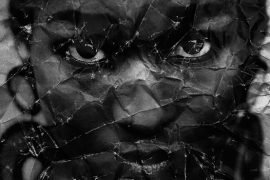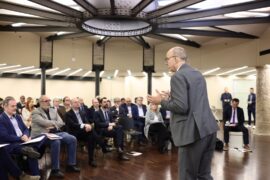[dropcap letter=”I”]
n the last few weeks I have had two biographies as bedside books, one that deals with the life of Pompeu Fabra—this year is the 150th anniversary of the birth of the engineer and grammarian who established the modern spelling and grammar rules for the Catalan language—and another that sets out every little detail of the life of Nirvana frontman Kurt Cobain. Oddly enough, Pompeu Fabra and Kurt Cobain were born on the same day, 99 years apart. But what disturbs me is that I have sometimes been distracted into confusing their biographies. I use the word distracted purposely because I mean to say that it was not a deliberate act. It is not that I forced the figure of Pompeu Fabra onto the sofa in the apartment of Kurt Cobain’s pusher, nor did I attempt to constrain the pulchritude of a high-brow club like the Ateneu Barcelonès by projecting a hypothetical governing council presided over by a dishevelled dude that the club members of Fabra’s time might have labelled him, and would doubtless today still judge him, as godforsaken. When I say that both stories have crossed in my mind at some point, I do not mean to refer to the figurations that I describe clumsily above—although it has a remarkably kitschy weight to it, and precisely for that reason, it is worth the trouble imagining—nor does it mean to be an excuse for a debate about postmodernity. It seems to me that it goes further, and the conclusion that I have reached is that there is a certain confluence.
 They called Pompeu Fabra maestro; Mestre Fabra. As a child he invented languages that would represent his toy soldiers, and he spent time at the harbour where he would seize vocabulary from the conversations of foreign sailors. It is thus clear that his condition as a grammarian came from birth. The day he saw the light, the day he understood that the language he spoke could also be written, was when he discovered his grandparents’ accountancy books written in Catalan. Not long after, his father suggested the young Pompeu should write some lines to his nephews in the Pyrenean town of Camprodon. Fabra agreed and started to write in Spanish, as was common at the time: Queridos sobrinos… Dear nephews… but suddenly found that he did not know how to carry on. The words to address his nephews did not flow in a language that was not his. So he started anew, this time in Catalan. This episode takes place somewhere between the second third and the end of the nineteenth century. But it is not until 1913, during the Mancomunitat—the “Commonwealth” in which Catalonia attains a certain autonomy from Spain’s central government for the first time in centuries—that the first grammar in modern Catalan is published. A couple of years earlier, Pompeu Fabra had returned from Bilbao where he had lived for ten years after being appointed to the chair in chemistry at the School of Engineers there. And in 1932 he culminates his mission with the publication of the Normative Dictionary of the Catalan Language.
They called Pompeu Fabra maestro; Mestre Fabra. As a child he invented languages that would represent his toy soldiers, and he spent time at the harbour where he would seize vocabulary from the conversations of foreign sailors. It is thus clear that his condition as a grammarian came from birth. The day he saw the light, the day he understood that the language he spoke could also be written, was when he discovered his grandparents’ accountancy books written in Catalan. Not long after, his father suggested the young Pompeu should write some lines to his nephews in the Pyrenean town of Camprodon. Fabra agreed and started to write in Spanish, as was common at the time: Queridos sobrinos… Dear nephews… but suddenly found that he did not know how to carry on. The words to address his nephews did not flow in a language that was not his. So he started anew, this time in Catalan. This episode takes place somewhere between the second third and the end of the nineteenth century. But it is not until 1913, during the Mancomunitat—the “Commonwealth” in which Catalonia attains a certain autonomy from Spain’s central government for the first time in centuries—that the first grammar in modern Catalan is published. A couple of years earlier, Pompeu Fabra had returned from Bilbao where he had lived for ten years after being appointed to the chair in chemistry at the School of Engineers there. And in 1932 he culminates his mission with the publication of the Normative Dictionary of the Catalan Language.
“I had often, like so many others, dreamt of spending old age quietly in an amicable corner of Catalonia, with the joy of seeing the fruit of what one had sown. It was, perhaps, a dream, but now I cannot even dwell on dreams.” Pompeu Fabra
Getting there was not easy. The economic hardship raising his family, the involuntary move to the Basque Country, the return and the expeditious usurpation of power by military dictator Gen. Primo de Rivera, and after that, just when it seemed life would be auspicious, first the Fets d’Octubre events—a general strike, armed insurgency and the declaration of a Catalan State—which meant between five and six weeks in prison and then exile, because he was guilty of being a Catalan nationalist and a republican. Fabra, along with other Catalan intellectuals, fled to exile in a Catalan Ministry of Culture mobile library—a great escape Anna Ballbona chronicles in this article (in Catalan) in the newspaper El Punt Avui. The day before at the Ministry, with franquistas—sympathisers of another military coup d’etat instigator, Gen. Franco—cruising around Barcelona for five days, he had attended a meeting of the Institució de les Lletres Catalanes—the Institute of Catalan Literature—to discuss how to go about succouring unpublished works. Fabra would never again return to Barcelona. France did not save him suffering, especially after General Petáin’s armistice when, despite the accords, the SS and the Gestapo would carry out searches in Montpellier. In one of the taverns in the city, where a barrel with the four painted bars of the Catalan flag was kept, Mestre Fabra had long conversations with Francesc Pujols: “the truth is that this tragedy has shaken us all. The youth, because it has broken the course that their lives would normally have followed, and now they lose the years that should have been of greatest profit … Of those who are already aged, we need not even mention … Me, I had often, like so many others, dreamt of spending old age quietly in an amicable corner of Catalonia, with the joy of seeing the fruit of what one had sown. It was, perhaps, a dream, but now I cannot even dwell on dreams.”
Kurt Cobain’s life was almost three times shorter than Fabra’s, but perhaps three times more turbulent. Ever since his parents split, the young man had headed for premature death. He leads a dissolute life and is taken in, temporarily, by friends and family. Then come his first rented, squalid homes, problems with alcohol, drugs and health.
Kurt Cobain built up so much rage that he had to resort to heroin. During his last few months he would spend hundreds of dollars daily on the drug. His entourage could not believe how his body, terribly emaciated, was able to take it
Kurt Cobain meant to acquire fame, and once achieved, submit it to a duel with the object of vulgarizing it. Meticulous, despite his self-destructiveness, he channelled his rage through the guitar that his uncle had given him. But that was not enough. He had built up so much—rage, that is—that he had to resort to heroin. During his last few months he would spend hundreds of dollars daily on the drug. People in his entourage could not believe how Kurt Cobain’s body, terribly emaciated, was able to take it. He had even managed to get a pusher to sneak into the hospital where he had been admitted and shoot heroin straight into his drip. Overwhelmed by his dependence and the chronic stomach pains he suffered, Kurt Cobain chose to take his life several times, deliberately overdosing, but which he overcame. Until he decided to shoot himself.
The engineer who was a grammarian and the lost cause who was a musician. It takes millions of people to produce a single genius. In the same way, in history, it takes millions of instances, preparations and developments for something exceptional to happen. But when it happens, when in “God’s mysterious workshop” an exceptional moment occurs, the course of history becomes irrevocable for years and perhaps centuries. These moments, writer Stefan Zweig calls pregnant or stellar moments because they shine above the fleeting night, and no writer, playwright or poet has the right to try to prevail over them.


















